|
|
|
Sort Order |
|
|
|
Items / Page
|
|
|
|
|
|
|
| Srl | Item |
| 1 |
ID:
108370
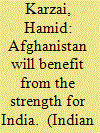

|
|
|
| 2 |
ID:
031020
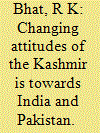

|
|
|
|
|
| Publication |
Jaipur, University of Rajasthan, 1968.
|
| Description |
16p.hbk
|
| Series |
Seminar Paper; no.xxxvi
|
|
|
|
|
|
|
|
|
|
|
|
Copies: C:1/I:0,R:0,Q:0
Circulation
| Accession# | Call# | Current Location | Status | Policy | Location |
| 001306 | 954.04/BHA 001306 | Main | On Shelf | General | |
|
|
|
|
| 3 |
ID:
091172
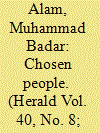

|
|
|
| 4 |
ID:
145456
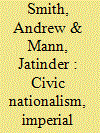

|
|
|
|
|
| Summary/Abstract |
This article explores the three themes of civic nationalism, imperial identities and Punjabi migration by focusing on the life of Sundar Singh, a migrant to Canada who came to prominence in the early 1900s, through his speeches. Sundar Singh employed the idea of equal status of all British subjects in the British Empire to argue for the migration of Sikhs to Canada and other British settler societies and their being treated with respect and fairness on their arrival in their new homes. Although Singh's claim to Britishness was rejected in many sections of Canadian society, it was supported by some white Canadians. The article suggests that British identity of the Empire's Dominions could, in some circumstances, be a force for the inclusion of South Asians. The article also illustrates the way in which developments in India impacted upon those of the diaspora across the British Empire. This idea is developed by demonstrating the importance of the triangular relationship between India, the United Kingdom and Canada as highlighted by the issue of Punjabi migration within the British Empire.
|
|
|
|
|
|
|
|
|
|
|
|
|
|
|
|
| 5 |
ID:
144146
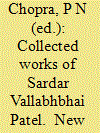

|
|
|
|
|
| Publication |
New Delhi, Konark Publishers Pvt Ltd, 2015.
|
| Description |
xxxiv, 304p.hbk
|
| Contents |
Vol. XII (1 Janurary 1947 - 31 December 1947): Champion of Hindu Muslim unity heroic
role in rehabilitation of refugees praises sacrifices and bravery of Sikhs
differences with Nehru on vital issues.
|
| Standard Number |
9789322008444
|
|
|
|
|
|
|
|
|
|
|
|
Copies: C:1/I:0,R:1,Q:0
Circulation
| Accession# | Call# | Current Location | Status | Policy | Location |
| 058595 | 954.035/CHO 058595 | Main | On Shelf | Reference books | |
|
|
|
|
| 6 |
ID:
118910
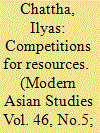

|
|
|
|
|
| Publication |
2012.
|
| Summary/Abstract |
This paper explores the part that the redistribution of evacuee property-the property abandoned by departing Hindus and Sikhs during the mass migrations after Partition-played in the institutionalization of corruption in Pakistan. By drawing on hitherto unexplored sources, including Pakistan's Rehabilitation Department papers, local police files and court records, it highlights the schemes of illegal appropriation, misappropriation, and paints a wholly convincing portrait of the scramble for millions of rupees worth of abandoned property in the towns and countryside of West Punjab. It shows how politicians, bureaucrats, powerful local notables and enterprising refugee groups grabbed properties, mainly by bribing officers charged with allocating them to incoming refugees, or by utilizing their personal contacts. The paper argues that the fierce competition for resources and temptations for evacuee property encouraged the emergence of a 'corruption' discourse which not only contributed to an atmosphere that was detrimental to democratic consolidation in the early years of Pakistan's history, but also justified later military intervention. This not only adds to the empirical knowledge of Partition and its legacies, but also makes a significant contribution towards our understanding of the transitional state in Pakistan.
|
|
|
|
|
|
|
|
|
|
|
|
|
|
|
|
| 7 |
ID:
174914
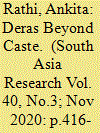

|
|
|
|
|
| Summary/Abstract |
In the northern regions of India, the rising popularity of alternative religious sects, prominently Deras, has sparked much interest in explaining this phenomenon. Current literature, based on case studies of specific Dalit Deras, relates the emergence of these religious sects to caste-based social discrimination and exclusion of lower castes by the mainstream Sikh religion. This article presents a case study of a small town, Patran, in the state of Punjab. Confirming the popularity of these alternative religious sects for upper and lower castes in the town, the article argues that the contemporary attractiveness of Deras needs to be understood also as a result of localised agrarian dynamics and related social pressures engendered by the process of rural to urban and agrarian to non-agrarian transition.
|
|
|
|
|
|
|
|
|
|
|
|
|
|
|
|
| 8 |
ID:
039972
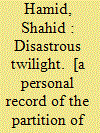

|
|
|
|
|
| Publication |
London, Leo Cooper and Martin Secker and Warburg Limited, 1986.
|
| Description |
xix, 364p.hbk
|
| Standard Number |
043619077X
|
|
|
|
|
|
|
|
|
|
|
|
Copies: C:1/I:0,R:0,Q:0
Circulation
| Accession# | Call# | Current Location | Status | Policy | Location |
| 026824 | 954.0359/HAM 026824 | Main | On Shelf | General | |
|
|
|
|
| 9 |
ID:
190671
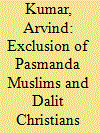

|
|
|
|
|
| Summary/Abstract |
Based on a re-reading of the Indian Constituent Assembly Debates in light of subsequent developments, this article provides new insights about the extent to which the Indian constitution allows affirmative action for redressing historical disadvantages and empowering marginalised communities. Since the post-colonial Indian state introduced the criterion of religion in the lists of Scheduled Castes (SCs), this sparked suspicions of efforts to prevent conversions, further augmenting India’s Hindu majority. The article re-examines such claims in light of the Indian Constituent Assembly Debates and subsequent Government Orders for notifying/modifying SCs. It argues that the list of SCs was never envisioned as religion-neutral, so that the exclusion of Pasmanda Muslims and Dalit Christians from the SCs is not a communal afterthought, while religion has all along not been the only or main criterion for affirmative action policies.
|
|
|
|
|
|
|
|
|
|
|
|
|
|
|
|
| 10 |
ID:
093708
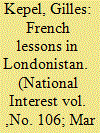

|
|
|
|
|
| Publication |
2010.
|
| Summary/Abstract |
MUSLIMS HAVE been landing on the shores of Britain and France for decades. And, as these populations arrived and settled in the Republic, Paris pursued a policy it believed would eventually lead immigrants to full cultural integration into French society. Meanwhile, London, facing a similar influx of foreigners, attempted to create a full-fledged multicultural polity. The former emphasized that what was shared between the new arrivals and their native hosts was crucial, their differences secondary. The latter argued that the British needed to respect the uniqueness of their immigrant neighbors-whether national, religious or ethnic-and that such a stance was at the core of a harmonious political system. In color-blind France, built on a long tradition of a strong, centralized state and the successful assimilation of southern and eastern Europeans-who have been migrating to the country since the nineteenth century-religious identity was not to interfere in public life. Under the French tricolor, state and nation were fused into the cradle of the one and indivisible Republic. In race-aware Britain, with Anglicanism as its established church, there was always room for different nationalities-English, Welsh, Scottish, Irish-under the Union Jack.
|
|
|
|
|
|
|
|
|
|
|
|
|
|
|
|
| 11 |
ID:
091730
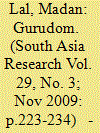

|
|
|
|
|
| Publication |
2009.
|
| Summary/Abstract |
This article critiques the close relationship between religion and politics by focusing on the nexus of politician-bureaucrats and deras (religious sects) particularly in Punjab. It is observed how heads of deras decorate themselves with various titles, cleverly generate unconditional devotion among followers and present themselves as worldly gods. In addition, books, music and other equipment associated with spirituality are now an industry worth millions of rupees every year. The article notes that the nexus of the deraswith politics takes various forms and may cause social conflicts. It criticises in particular the bargaining capacity of the deras, which causes politicians to seek their patronage. The article discusses worrying trends about the misuse of religion that are now identifi able.
|
|
|
|
|
|
|
|
|
|
|
|
|
|
|
|
| 12 |
ID:
139892
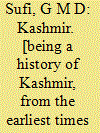

|
|
|
|
|
| Publication |
New Delhi, Light and Life Publishers, 1974.
|
| Description |
343-942p.hbk
|
| Contents |
Vol. II.
2vol. set price Rs. 300.00
|
|
|
|
|
|
|
|
|
|
|
|
Copies: C:1/I:0,R:0,Q:0
Circulation
| Accession# | Call# | Current Location | Status | Policy | Location |
| 013075 | 954.6/SUF 013075 | Main | On Shelf | General | |
|
|
|
|
| 13 |
ID:
139893


|
|
|
|
|
| Edition |
8th ed.
|
| Publication |
Srinagar, Chronicle Publishing House, 1967.
|
| Description |
ix, 304p.hbk
|
|
|
|
|
|
|
|
|
|
|
|
Copies: C:1/I:0,R:0,Q:0
Circulation
| Accession# | Call# | Current Location | Status | Policy | Location |
| 001380 | 954.6/KAU 001380 | Main | On Shelf | General | |
|
|
|
|
| 14 |
ID:
029660
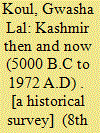

|
|
|
|
|
| Edition |
8th ed.
|
| Publication |
Srinagar, Chronile Publishing House, 1967.
|
| Description |
xiv, 311p.hbk
|
|
|
|
|
|
|
|
|
|
|
|
Copies: C:1/I:0,R:0,Q:0
Circulation
| Accession# | Call# | Current Location | Status | Policy | Location |
| 012002 | 954.913/KAU 012002 | Main | On Shelf | General | |
|
|
|
|
| 15 |
ID:
093186
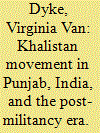

|
|
|
| 16 |
ID:
157869
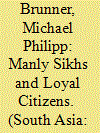

|
|
|
|
|
| Summary/Abstract |
This article looks at Khalsa College, the first college specifically aimed at the Sikh community in late colonial India, and its schemes for and ideals of physical culture. Despite Sikh communal and Indian national aspirations, as well as a robust transnational discourse on ‘scientific’ physical culture that was being increasingly articulated in the inter-war period, Khalsa College remained remarkably devoted to ‘modernised’ physical exercise schemes focusing on British ‘manly games’ such as football, hockey and cricket. The essay locates the reasons behind the college management's staunch loyalty to Britain and opposition to newer, radical Sikh politics; its use of images of Sikh military traditions and ‘martial manliness’, often used to demarcate Sikhism from an ‘effeminate’ Hinduism; and its specific interest—shared by the colonial authorities—in keeping the students fit for military service.
|
|
|
|
|
|
|
|
|
|
|
|
|
|
|
|
| 17 |
ID:
126171
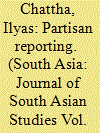

|
|
|
|
|
| Publication |
2013.
|
| Summary/Abstract |
This study analyses the press reporting in India and Pakistan of Partition-related violence in 1947 and the unsuccessful attempts by the colonial authorities to censor provocative accounts in a context of administrative collapse. Assessing the extent of bias exhibited by the coverage, the study highlights the respective roles of the press and of rumours in spreading 'news' of the violence and so contributing to its cycle. The focus is on the tactics of all the sides involved which were designed to attribute responsibility to a hostile 'other', while playing down each community's involvement in violence as merely defensive. The study presents a modest contribution to the wider notion of the role of 'blame displacement' in reporting violence and the inability of what might be termed the transitional colonial state to control the press amid a general decline in governance.
|
|
|
|
|
|
|
|
|
|
|
|
|
|
|
|
| 18 |
ID:
030304
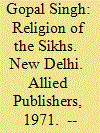

|
|
|
|
|
| Publication |
New Delhi, Allied Publishers, 1971.
|
| Description |
vi,195p
|
|
|
|
|
|
|
|
|
|
|
|
Copies: C:1/I:0,R:0,Q:0
Circulation
| Accession# | Call# | Current Location | Status | Policy | Location |
| 028695 | 294.6/GOP 028695 | Main | On Shelf | General | |
|
|
|
|
| 19 |
ID:
153131
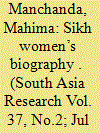

|
|
|
|
|
| Summary/Abstract |
This article examines the biography of Bibi Harnam Kaur, the young co-founder of the Sikh Kanya Mahavidyalaya, established in 1892 in Ferozepur, Punjab as one of the earliest schools for the education of Sikh girls. The opening of this school by her husband, Bhai Takht Singh, raises questions about the extent to which such initiatives reflected the desire of Sikh men and of the Singh Sabha at that time to ensure that their women should become educated to emerge as ideal wives and mothers. The clearly hagiographical biography presents Bibi Harnam Kaur as an extraordinary young woman destined for greatness, but also raises many tensions, contradictions and conflicts hidden below the surface concerning female education in India, which a feminist reading of this biography against the grain seeks to bring out.
|
|
|
|
|
|
|
|
|
|
|
|
|
|
|
|
| 20 |
ID:
108399
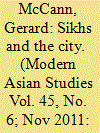

|
|
|
|
|
| Publication |
2011.
|
| Summary/Abstract |
The historiography of South Asian diaspora in colonial Southeast Asia has overwhelmingly focused on numerically dominant South Indian labourers at the expense of the small, but important, North Indian communities, of which the Sikhs were the most visually conspicuous and politically important. This paper will analyse the creation of various Sikh communities in one critical territory in British Asia-Singapore, and chart the development of the island's increasingly unified Sikh community into the post-colonial period. The paper will scrutinize colonial economic roles and socio-cultural formation, whilst links of Singaporean Sikhs to Punjab and their place within the post-colonial Singaporean state will preoccupy the latter portion of the paper. It will argue that more complicated notions of division relative to the social norms of Punjab must be acknowledged in this region of Sikh diaspora and indeed others. The final sections will assess the remarkable success of local Sikhs in utilizing statist policies of 'domesticating difference' towards altered 'community' ends. Such attachment to the state and the discursive parity of Singapore's Sikhs with official values, moreover, stymied the appeal of transnational Sikh militant movements that gained momentum in the West in the 1980s. The result has been the assertion of 'model minority' status for Singapore's Sikhs and notably successful socialization into Singaporean society.
|
|
|
|
|
|
|
|
|
|
|
|
|
|
|
|
|
|
|
|
|